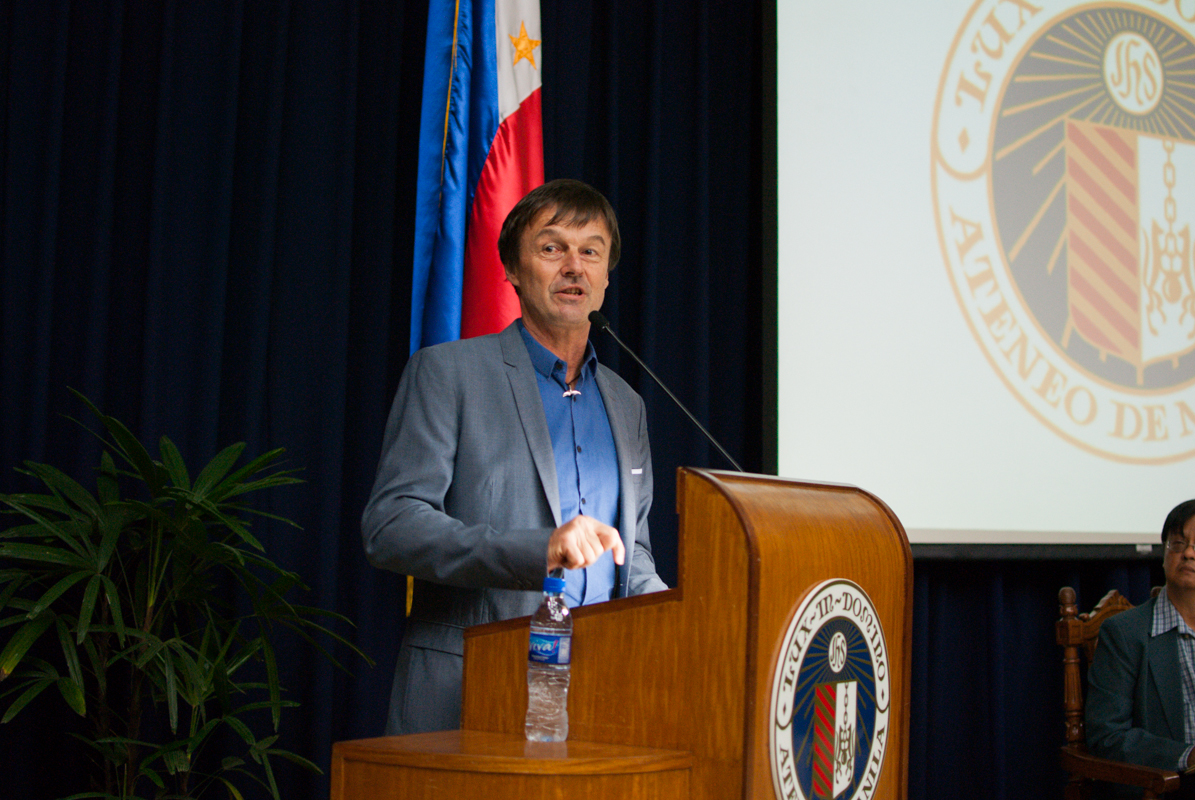AN EMISSARY from France, along with members of the Ateneo administration, engaged in a forum on climate change last January 23 at Escaler Hall.
The forum was held in light of the upcoming United Nations (UN) Climate Change Conference in Paris, which will be held from November 30 to December 11. It was organized by the university in partnership with the Embassy of France in Manila.
Special Envoy of the French President for the Protection of the Planet Nicolas Hulot, University President Jose Ramon Villarin, SJ and Ateneo School of Government Dean Antonio La Viña served as speakers in the two-hour forum.
The panel addressed questions on the political, economic and social aspects of climate change as well as the expected outcomes of the conference in Paris. The forum was part of Hulot’s itinerary in a five-day trip to the country in preparation of French President François Hollande’s state visit in March.
Proposing alternatives
Villarin, who gave the welcoming remarks, discussed a three-pronged approach to addressing climate change—education, networking and governance. He emphasized the urgent need to address the problem, describing the effects of climate change as “a menacing storm on the horizon that endangers the very center of our lives in our planet, threatening to uproot millions and [drive] them further into the margins.”
Likewise, Hulot stressed the need for drastic measures against climate change. To guard against further disasters, Hulot pointed out that the concrete target is to limit global climate temperature increase to two degrees Celsius. Letting the temperature rise to more than two degrees will result in global warming being “irreversible whatever human beings do.”
Hulot proposed that all 195 UN member-states adopt a “universalist point of view” in solving the issue and reconstruct the current economic and political models that inhibit solutions to climate change. “We should make a transition from a model based on competition to one based on cooperation,” he said.
He argued that the excessive use of fossil fuels in the current energy model hinders the economic progress of developing countries and further worsens the greenhouse effect. “The difficulty in changing the economic model and above all, the energy model, has paralyzed us, put us in shock,” Hulot added.
During the open forum portion of the talk, Hulot emphasized the need for the diversification of renewable energy sources in the global market and advocated its development as “a factor for peace.”
Mobilizing solutions
The upcoming conference in Paris will be the twenty-first session of the UN Framework Convention on Climate Change (UNFCCC) Conference of Parties (COP). Held yearly, the COP sessions aim to evaluate the global progress in addressing climate change and arrange legally binding contracts in accordance with the Kyoto Protocol, a treaty signed in 1997 that sets targets in reducing greenhouse gas emissions.
In his remarks, La Viña explained that COP 21 will involve the plans of “99% of the countries of the world” or 195 nations, according to the UNFCCC website. These plans, called “intended nationally determined contributions,” will be discussed and rules for compliance will be negotiated. In essence, La Viña said, the COP session “will be the meeting where the world will decide how to deal with climate change.”
In this meeting, the Philippines, according La Viña, will have “to show the world that [it] can take leadership” on the issue as it has been one of the most constant victims of the effects of climate change in the recent years. The plans set forth will thus have to be “ambitious, but realistic.”
Concerns have been raised about the probable success of COP 21, given the previous controversies surrounding the sessions. The Copenhagen Summit in 2009 or COP 15 is particularly infamous for its failure to broker binding principles among the nations.
Hulot addressed these concerns by dubbing recent environmental initiatives in China and the United States, two states that have been cited as partly responsible for the failure of COP 15, as good starting points for the success of COP 21. “We are starting out worried,” he said, “but we are hoping to be surprised.”
French leadership
While La Viña emphasized the need for the courage of all delegations, he added that the success of COP 21 will also depend on its organizers. “We trust that France will lead us to a better world in Paris,” he said.
Hulot, who had been appointed special envoy in 2012, stated that the responsibility of France is to provide a neutral and conducive environment for negotiations Preparations for creating a conducive environment have indeed been underway. According to the website of the French Ministry of Foreign Affairs, Paris-Le Bourget, the appointed site of the conference, is the most logistically suitable and accessible location for “not only the official delegations but also civil society and the media, which are crucial to the success of the Conference.” Programs and policies to increase civil society participation and minimize the environmental impact of the conference are also being put into place.
Regardless of the success of COP 21, Hulot stressed, it is important that France will bring its own contribution in mitigating the effects of climate change. He discussed measures such as the French Energy Transition Law that intends to support renewable energy sources and highlighted his country’s goal of cutting energy consumption in half by 2050.




